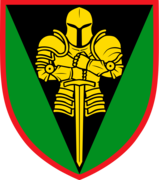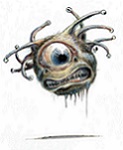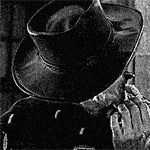|
Real talk: DMs hiding numbers makes combat take half again as long, for absolutely no valid reason.
|
|
|
|

|
| # ? Jun 1, 2024 05:27 |
|
Conspiratiorist posted:Real talk: DMs hiding numbers makes combat take half again as long, for absolutely no valid reason. Bloodied, Badly Injured, Near Death, Dead - >50%, >25%, >10%, 0% Works in place of raw numbers if you don't feel like giving them away. Bloodied is basically axiomatic in the parlance for >50% HP at this point, and the rest doubles as something anyone who's played Baldur's Gate would recognize the meaning of.
|
|
|
|
ACs, DCs, attack bonuses.
|
|
|
|
Some of the best advice I ever got was that the numbers are just abstract representations of combat ability trained adventurers would be able to assess. And if the only challenge in your fights comes from hiding stats then you run boring fights. This words doubly well with signature save or die spells. It's way more interesting for a party to know "the creature in the next room will gently caress us up royally unless we avoid it or come up with something clever."
|
|
|
|
Yeah the reason why you want your players to have as much information as possible is so that they can react accordingly. In my 3e game, I keep track of what AC is needed to hit a monster so that I can tailor my Power Attack for maximum damage, but even without that kind of specificity, knowing that someone is about to die, knowing who is going to be shot next, knowing what the next spell is going to be, knowing which saving throw is "bad" for any given target, all of that will influence what they're going to do next. If it's all a mystery, then they're just going to go by gut feel, which may turn fights samey and/or uncoordinated, especially since most tables don't run combats often enough for players to be able to extract this kind of information by "statistical feel", the way one might do so in an ARPG or MMO.
|
|
|
|
Playing with open stats is a thought that's straight up never occurred to me, because nobody I've played with has done it in the past, and even RPGs typically don't do it. However, if it speeds up combat and encourages tactical play, I'm all for it. Even the halfway solution of "barely injured, etc." that the Baldur's Gate games do would make things even slower.
|
|
|
|
We have a TV on the wall connected to Roll20 so we play with the health bars. It's a good in-between because while the players don't know the exact number of HP left they have a reasonable idea.
|
|
|
|
For “boss” fights I like to show the players the total damage they’ve dealt rather than the monster’s max HP ticking down. If the players know which numbers they need to hit (AC, etc.) it can keep rolls moving faster and helps other players know whether or not they should spend a resource to buff someone. We’ve carried the concept of Bloodied to other systems, too. In my current Ryuutama game, I’ll say the enemies are “flashing red” following retro game tropes.
|
|
|
|
inthesto posted:Playing with open stats is a thought that's straight up never occurred to me, because nobody I've played with has done it in the past, and even RPGs typically don't do it. Same; it's so simple I don't know why I never thought to do it when running D&D, but I absolutely will now I've always wanted people to move past the weird like...I dunno how to describe, like, deference to the DM in combat, pretending we all can't infer what the AC of an enemy is through previous attacks "Ok uhh...does 25 hit?" "Yes" Like we all know that the previous person hit on 16 let's move it along Is that baked into peoples' behaviours because of some cargo cult thing from systems where AC wasn't "locked in"? I'm only familiar with it from 3E onwards Waffles Inc. fucked around with this message at 14:35 on Apr 2, 2019 |
|
|
|
Waffles Inc. posted:Same; it's so simple I don't know why I never thought to do it when running D&D, but I absolutely will now Did 5e actually get rid of the status spell? If so, that's a blessing. Technically in 3e you're supposed to cast a third level spell to know the HP count of other party members, it's the stupidest thing.
|
|
|
|
Piell posted:We have a TV on the wall connected to Roll20 so we play with the health bars. It's a good in-between because while the players don't know the exact number of HP left they have a reasonable idea. I like the way Roll20 does this as well. I also make it fairly easy for my players to research their enemies through arcana checks, nature, or history checks, whereupon I reveal the character sheet to them.
|
|
|
|
Elector_Nerdlingen posted:I thought that it referred to events, not group connections. Thus, you're starting part way through the story as a way to have a disparate group of characters be connected. Which only works because you're not beginning at the story's beginning (eg, "you are all sitting in a tavern" or "you all board an airship") but rather part way through the story, after one or more significant events (eg, "the airship crashed" or "the tavern burned down"). This might be a(nother) case of me needing a better/different term to describe how I do things. Wouldn't be the first time.
|
|
|
|
I don't wanna reveal my character sheets because then my players will know I just make up stats as they're called for.
|
|
|
|
koreban posted:Bloodied, Badly Injured, Near Death, Dead - >50%, >25%, >10%, 0% I had a GM who went the extra mile on roll20 to set up a macro that automatically changed a displayed name using the BG injury levels for creatures as they got beat down. Was kind of annoying to actually set up, but easy to apply once it was set up.
|
|
|
|
Waffles Inc. posted:Same; it's so simple I don't know why I never thought to do it when running D&D, but I absolutely will now No, it’s just broken ‘ritual’. The GM is the arbiter of everything that happens in the world, so then you must call and respond every roll regardless of the fact that the result is known and the stakes are explicit in the rules. Presenting the stats directly short circuits the performance of that ritual. VV Sure, that’s fair. DalaranJ fucked around with this message at 19:11 on Apr 2, 2019 |
|
|
|
Alternatively it might not be deference and ritual, but just bad short term memory and maths stuff. I basically cannot keep more than one thing in my head at a time so in the time I've taken to do the quick maths to know I've got a 17 I've forgotten that I need a 16 to hit.
|
|
|
|
Tips to running combats that are fun and also aren't spreadsheet simulations: 1. Use Giffglyph's monster maker system (that relies on Gradenko's tables) to make monsters with interesting and varying abilities. Try to synergize at least two of the monsters' abilities. 2. When players hit, announce "[Character] hits on [Roll]" and give the number. When they can work out the exact AC amongst themselves if they're paying attention. For near misses I usually will telegraph the monster avoiding the blow somehow or it glancing off of armor/shields/chitin/etc. "Your strike catches the Orc in his pauldron, slightly denting the iron, but otherwise seemingly not affecting the Orc." 3. If the creatures can or should have a class associated with it, think about abilities that class naturally gets and use them. Bandits and Goblins are rogue-y, so let them disengage as a bonus action and go after a soft target in combat. Fighters can Second Wind (instead of attacking). Sorcerer's are affected by Wild Magic. Shamans are just evil druids with shapeshifting abilities. Play them intelligently, with a well-honed sense of self preservation. 4. Grapple players, take hostages, mexican standoffs, use terrain advantages, Thermopylae defenses, pincher ambushes, etc. The only thing more boring than a Fighter's "I attack" every round is monsters who do the same thing and only the same thing, ever. Have them blow horns to summon nearby allies, or start fires to cause panic and distraction so they can escape. Obviously don't do this with every single encounter, but a majority of non-randomized encounters should feature something along these lines. If you're running LMoP and your party manages to outright kill two of the four or five goblins in the goblin ambush in a single round, have the other two (who saw their friends get cut down nearly instantly) gently caress right off, right away. They are opportunists after easy gold, not zealots ready to die to enforce their "no crossing" goblin law on the Triboar Trail. Similarly, zealots gonna zealot, so by all means have them throw themselves at the players and as numbers dwindle, they douse themselves with Alchemist's Fire to try and take as many player characters with them as they can. I'm personally not a fan of DMing open-book D&D where my players instantly know that the knight they're squaring off against is 17AC 52HP +3Str +3Con Feat: Shield Mastery before the first initiative roll is made. That's just lovely video games in a clunky medium. Neverwinter Nights did that better. I can pass along the same information narratively, and clearly by defining my terms with my players and playing the character as an intelligent being who will run at 25% HP when he becomes Badly Injured to avoid being killed outright. Or in the case of my game last week, a Legionnaire Scout from an opposing army to my players was on the losing side of a fight, grappled the Paladin's retainer, knocked him unconscious and threw himself and the retainer from a bridge into the river, escaping with his hostage. His fellow Legionnaires held off the party's pursuit to allow their partner to escape with his prisoner, knowingly sacrificing themselves in the process. The entire combat took around 50 minutes, in less than a single round the players were able to grasp that the AC of the Legionnaires was higher than 16, and less than 18 (it was 17). The players coordinated their attacks on Bloodied and Badly Injured soldiers, the Druids used Spike Growth and Dust Devil to hinder the Soldiers' advancement and push them away from allies. Never once did I give a straight face HP number, but my players always had a good sense of what was going on because while I listed the Legionnaires as L1, L2, L3 on my tracking paper, I kept track of their statuses and said "The bloodied Legionnaire moves towards Dagobert, striking out with his Warhammer." or "The Badly Injured Soldier manages to get to the cart, taking damage from the spike growth doing so, he - [roll] - grapples Genovise in the back of the cart, turning him to face the melee. He's holding the retainer as a body shield. -- [the next round] -- The badly injured soldier backs toward the end of the cart, he - [roll] - strikes Genovise with the pommel of his dagger, rendering him unconscious and falls backwards off of the cart, past the edge of the bridge and into the swift moving water of the river below." "Seeing their ally escaping, the near death Legionnaire howls a war cry 'Death to the enemies of the Legion!' which gives him a burst of courage and adrenaline [rolls Second Wind, granting an additional 17hp] - he looks invigorated and intends to hold you off as long as possible." Look, there's nothing wrong with giving raw numbers and asking your players to rush through combat as quickly as possible to get as much done in an evening as you can. To me, that feels sterile and not at all unlike a video game. There's a place for that, but the modern zeitgeist of D&D is leaning much harder into crafted narrative gamescapes with deeper role playing opportunities.
|
|
|
|
Infinite Karma posted:Do people still have the PCs "meet" in a tavern by coincidence at the beginning of a campaign? That seemed like the starting point of every comedy murderhobo game I played in, but never one meant to have, like, a plot. The version I've used a couple of times is to start the PCs in a tavern, with most of them not actually knowing each other. Then the molotov cocktails come in through the window, followed by a group of raiders/slavers. Everyone who stands up to fight is a PC.
|
|
|
|
Waffles Inc. posted:Same; it's so simple I don't know why I never thought to do it when running D&D, but I absolutely will now Part of this is building confidence around rolling past a certain point(I make a habit of just saying "yeah I hit" if I roll a nat 17+). But theres another part to that behavior that keeps it in play, reactions. Enemy casters might have Shield, Gnolls in 4e had the ability to boost allies' AC if they were adjacent. Those kind of things build uncertainty at the table to the point there will always be a little bit of "Does 30 vs AC hit?"
|
|
|
|
koreban posted:Tips to running combats that are fun and also aren't spreadsheet simulations: Thanks for this post! Where can I find Giffglyph's monster maker system? Also on monster abilities, I just bought this 336 page supplement which adds new abilities and types to every entry in the monster manual, $20 but so far it's worth it, way more interesting abilities and monster effects.
|
|
|
|
clusterfuck posted:Thanks for this post! Where can I find Giffglyph's monster maker system? Here’s the web app: http://giffyglyph.com/monstermaker/ That’s the easiest way to create/manage the creatures. If you want to read the bits and bolts or have a written reference, it’s on a google drive here.
|
|
|
|
That’s amazing, thanks! Does anyone have any or found any resources for traps for PCs to use and carry? Our party is shopping at a market run by kobolds and their trapsmiths. Found brief mention in DMG, Xanathars and comprehensive equipment manual but not the handy list I was hoping for.
|
|
|
|
Waffles Inc. posted:I've always wanted people to move past the weird like...I dunno how to describe, like, deference to the DM in combat, pretending we all can't infer what the AC of an enemy is through previous attacks The cycle of "I roll an 18, do I hit? Yes, that hits" isn't really born of some deliberate desire to hide AC - it's just a natural flow of information even if the DM doesn't have any intention of hiding information from the players. To break this habit, you'd have to actively announce, perhaps by writing it out on a piece of card (or explicitly displaying it on roll20) that, yes, the monster has 15 AC, stop asking.
|
|
|
|
Asking is just polite. I like the asking. I also like to ask, "do I believe ___?" instead of "im going to roll insight".
|
|
|
|
gradenko_2000 posted:The cycle of "I roll an 18, do I hit? Yes, that hits" isn't really born of some deliberate desire to hide AC - it's just a natural flow of information even if the DM doesn't have any intention of hiding information from the players. It's grounded in a lot of poo poo. I mean first of all, D&D used to be played entirely behind a screen. Hell, Gygax used to run the game from behind a pile of file cabinets and refused to give information to anyone other than the party leader. Secret information has forever been part of the game's playspace; not knowing what is dangerous and what isn't gave early D&D a lot of its flavor. That being said, it's definitely been maintained for some other reason because as the game has mutated away from basement foraging for gold into grand epic fantasy storytelling, that kind of thing really isn't important anymore. Part of it is definitely just nostalgia. Part of it is a frankly unhealthy aversion to 'metagaming' that I've seen many new DMs fight about for some ungodly reason, as if talking about game concepts at the table were some kind of cursable offense. I know some people maintain it to allow some kind of edge when fudging rolls behind the screen; god knows if your combat is going slowly maybe that 18 AC you gave your bad guys was a bad move and let's go ahead and just call it a 15 for ease of play. I think a happy medium is if someone manages to hit the target, just tell them what the AC is. The last thing I want to do is keep reminding my players over and over what all the enemy ACs are and I can't afford a cool system where I put up numbers on a big screen or whatever, but yeah it's pretty stupid to keep it hidden once the cat is out of the bag because you can just do the math if you want.
|
|
|
|
Mendrian posted:I think a happy medium is if someone manages to hit the target, just tell them what the AC is. The last thing I want to do is keep reminding my players over and over what all the enemy ACs are and I can't afford a cool system where I put up numbers on a big screen or whatever, but yeah it's pretty stupid to keep it hidden once the cat is out of the bag because you can just do the math if you want. You're definitely not wrong. I don't advocate playing behind file cabinets and being opaque about any numerical details, but a part of modern D&D is that anyone and everyone has access to 5e Fight Club or DNDBeyond and the moment you drop "A wild Boulette appears!" they're 15 seconds on their phone app away from knowing the stats anyways. I don't broadcast AC numbers, but descriptively let my players clearly know when they succeed and/or fail partly to keep them all engaged. If I say "18AC, 42HP, top of initiative, go!" then when it's not a person's turn, they're on Facebook. When I call their initiative step and they ask "what's his HP at? 28? okay, I [insert ability here], I roll 21, for 13 damage" and the phone's back up. By slightly obfuscating the information behind general descriptions and direct responses to the actions of players in other steps of the initiative order, coupled with the monsters being way more intelligent than single-minded meatbags meant to challenge action economies and resource pools of the party collective, my players need to pay more attention so they can alter their planned actions when their initiative comes up. Nothing makes me happier than seeing someone who's two steps away in initiative order suddenly drop their composure because their planned action is a bad move now and they have one character's initiative before they're up, and now they have to recalibrate for this new unforseen situation. It's way more of an issue in games with more players. I generally have 5-8 at my table now, so keeping engagement high is something I actively have to pursue. With 3 people at a table, I think you can be more relaxed about it - I still wouldn't, I don't like playing Dungeons and Spreadsheets. But that's why I make archetypal monsters using Gifflglyph's monster maker and not the DMG. Most of my players have DMG monster stats memorized and I need them to feel fear and confusion when the creatures do something they didn't expect.
|
|
|
|
Another little trick is describing near misses as glancing blows. If an enemy has 16 AC and one of my players rolls a 14 to hit, I'll tell them how they scratched the creature's hide but didn't draw blood - or how their attack bounces off their opponent's shield. Something that indicates they're in the ballpark.
|
|
|
|
Razorwired posted:Part of this is building confidence around rolling past a certain point(I make a habit of just saying "yeah I hit" if I roll a nat 17+).
|
|
|
|
Bad Seafood posted:Another little trick is describing near misses as glancing blows. If an enemy has 16 AC and one of my players rolls a 14 to hit, I'll tell them how they scratched the creature's hide but didn't draw blood - or how their attack bounces off their opponent's shield. Something that indicates they're in the ballpark. Within 5ac of the target ac is always some sort of glancing blow, parry, shield block, or other some such strike. It’s a hit, without damage. Misses by more than 5 are wide swings, dodges, late strikes, etc. Another subtle way to telegraph AC values without giving exact numbers.
|
|
|
|
Splicer posted:It drives me nuts when people don't do this. Someone rolls a nat 15 vs a goblin and then stares at their sheet trying to find the number to add. It's a goblin, whether you rolled 20 or 21 total is not going to make it more dead. Same for saving throws etc. This is especially true with the so-called 'bounded accuracy' of 5e. AC is going to vary between like, 12 and 20. If you hit 22 and you haven't even added in your prof bonus yet, you probably hit, and if not, you get to slap the DM in the face for not making clear that you are fighting some kind of god.
|
|
|
|
Mendrian posted:This is especially true with the so-called 'bounded accuracy' of 5e. AC is going to vary between like, 12 and 20. If you hit 22 and you haven't even added in your prof bonus yet, you probably hit, and if not, you get to slap the DM in the face for not making clear that you are fighting some kind of god.
|
|
|
|
Last year I played a couple sessions where one player wouldn't give up slowly calculating their exact numbers out loud while talking over the DM, who was going "He's dead. Dude. Leave it. You rolled above ac and your damage mod is higher than his hp. It's fine." Went from frustrating to funny and then back again once I realised the dude wasn't taking the piss.
|
|
|
|
Is it worth my time trying to do any kind of roll for fights my party can breeze over? Like if an adventure says "This jail is guarded by a pair of hobgoblins" and my party is level 8, obviously I'm not even going to bother playing it out because that's a waste of everyone's time. However, is there any kind of merit in doing a roll to represent that the party expended some kind of resources? Like, telling the party they automatically win because duh of course they would, but there's a 15% chance that everyone loses 1d4 HP just to represent somebody made a small slip-up and the fight wasn't completely free. I dunno what I hope to accomplish with his. Maybe just informing the players than even steamroll fights carry a chance of expending a non-zero amount of resources.
|
|
|
|
If you're gonna skip ahead anyway, you could always just ask them what it cost. Or think ahead and formalise it like Pick any 2 of: * The party takes 3d8hp damage, divided however. * Two PCs lose or break an important piece of gear each. * The party expends 4 levels worth of spell slots. Whoever loses the most resouces gets to describe the victory. (But a better answer is "don't include bullshit combats"). Elector_Nerdlingen fucked around with this message at 10:44 on Apr 3, 2019 |
|
|
|
Elector_Nerdlingen posted:(But a better answer is "don't include bullshit combats"). Tell that to WotC.
|
|
|
|
Elector_Nerdlingen posted:If you're gonna skip ahead anyway, you could always just ask them what it cost. Elector_Nerdlingen posted:(But a better answer is "don't include bullshit combats"). e: it's criminal the base game doesn't have clear front and centre guidelines for how to speed up the brute force method though.
|
|
|
|
Misread the question, sorry! But yeah - the fail state shouldn't be "bullshit combat", if a bullshit fight starts, it should just be "other methods failing, it costs x much to bypass", and in this case that cost is because of an in-fiction minor fight breaking out rather than (eg) the trap damaging you as you pass. I'd probably prefer the fail state to be "so you murder those guys, but..." and then "the prison is on alert and surprising guards is now hard/impossible" or something else other than just a cost, but that's not really what the question was about either. Elector_Nerdlingen fucked around with this message at 12:39 on Apr 3, 2019 |
|
|
|
Well im the only full caster left in my Curse of Strahd adventure. Our druid just got killed (gave up on the character) and has decided to roll a barbarian. That leaves us with a Paladin, Eldritch Knight, Monk, Swashbuckler rogue, barbarian and me as a tempest cleric. Meanwhile we keep getting absolutely smashed by Fireballs (the last one from Strahd himself) and I long for a counterspell.
|
|
|
|
I'd say add more Hobgoblins or other enemies to make the fight non-trivial. Then make it interesting. Add some wrinkle like maybe there's hobbos with bows from a perch, the hobs have set fire to some broken down carriages or something out front to funnel the players a certain a way, the hob leader is mounted and can make charges past the players. I just wouldn't run a completely trivial fight. You can and should adjust and change modules, especially WOTC trash. Strahd is one of the better ones, and it's still pretty garbage as far as a game goes. The way it's written, the challenge, the rules. You can do a lot to improve it. A quick google search will give you some ideas. When I ran it, I changed quite a bit. One simple thing you can do is look up 4E monster manual stuff for whatever the 5E equivalent is - 4E creatures for all their bullshit had way more interesting things than "multiattack". Make the hobs use pack tactics. Add a hob shaman with some magic. Make Strahd look on in full form and throw a mist down around the players that reduces their visibility. Make skeleton hands pop up Evil Dead style that turns the terrain into difficult terrain. For the love of god don't run some "1d4 hobgoblins are outside" for your combat. Firstborn fucked around with this message at 13:43 on Apr 3, 2019 |
|
|
|

|
| # ? Jun 1, 2024 05:27 |
|
Hobs seem like the type of enemy that, regardless of level, can pose a danger simply due to them being an actual military force.
|
|
|



































